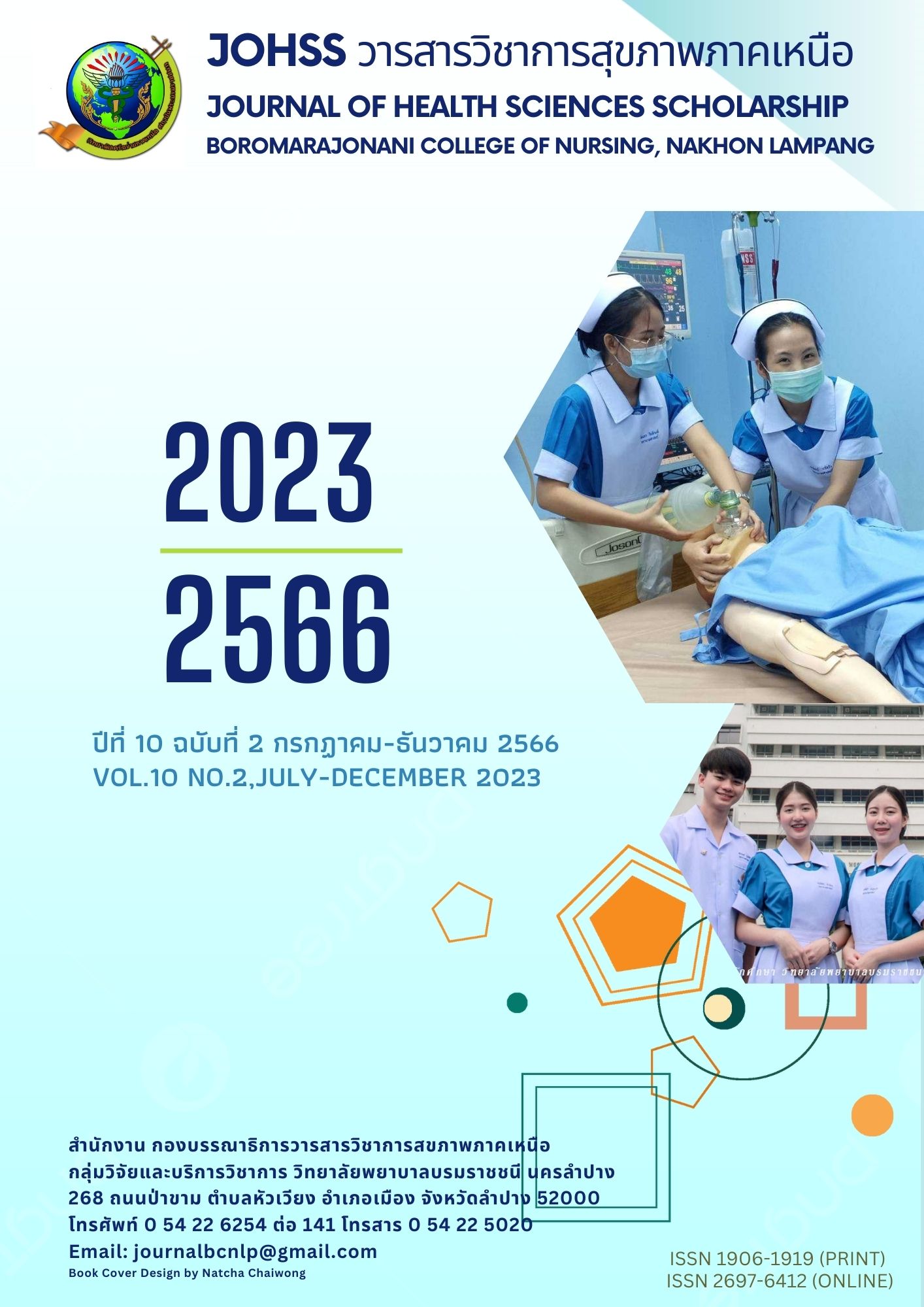จรณทักษะที่จำเป็นของบัณฑิตพยาบาลในโรงพยาบาลเอกชน
คำสำคัญ:
จรณทักษะ,บัณฑิตพยาบาล, โรงพยาบาลเอกชนบทคัดย่อ
การวิจัยเชิงพรรณนาครั้งนี้มีวัตถุประสงค์เพื่อ (1) สังเคราะห์จรณะทักษะที่จำเป็นของบัณฑิตพยาบาลโรงพยาบาลเอกชนและ (2) ศึกษาความต้องการจรณทักษะ ที่จำเป็นของบัณฑิตพยาบาลในโรงพยาบาลเอกชนเขตจังหวัดสมุทรสาคร กลุ่มตัวอย่างมี 2 กลุ่ม คือ (1) กลุ่มผู้บริหารฝ่ายการพยาบาลโรงพยาบาลเอกชนในจังหวัดสมุทรสาคร จำนวน 7 คนเลือกกลุ่มตัวอย่างแบบเจาะจง เก็บข้อมูลด้วยการสัมภาษณ์โดยใช้แบบสอบถามกึ่งโครงสร้าง และ (2) กลุ่มผู้บริหารทางการพยาบาลระดับต้นและพยาบาลปฏิบัติงานในโรงพยาบาลเอกชนเขตจังหวัดสมุทรสาคร จำนวน 250 คน ใช้การสุ่มอย่างง่าย เครื่องมือที่ใช้ในการวิจัยเชิงปริมาณได้แก่ แบบสอบถาม เรื่องจรณทักษะที่จำเป็นของบัณฑิตพยาบาลในโรงพยาบาลเอกชนเขตจังหวัดสมุทรสาคร มี 2 ตอน เป็นข้อมูลส่วนบุคคล 4 ข้อ และจรณทักษะที่จำเป็นของบัณฑิตพยาบาลในโรงพยาบาลเอกชนเขตจังหวัดสมุทรสาครจำนวน 60 ข้อ เป็น มาตราส่วน ประมาณค่า 5 ระดับ มีความเชื่อมั่นของแบบวัด 0.958 วิเคราะห์ข้อมูลโดยใช้สถิติเชิงพรรณนา การแจกแจงความถี่ ค่าร้อยละ ค่าเฉลี่ย ( ) ส่วนเบี่ยงเบนมาตรฐาน (S.D.) และการวิเคราะห์ข้อมูลจากการสัมภาษณ์ โดยการวิเคราะห์เนื้อหา (content analysis) ผลการวิจัย พบว่าจรณทักษะ ที่จำเป็นของบัณฑิตพยาบาลในโรงพยาบาลเอกชนเขตจังหวัดสมุทรสาคร มี 6 ทักษะ เรียงลำดับจากมากไปหาน้อยได้แก่ 1) ทักษะการสื่อสาร ( ( = 4.73, S.D= 0.46) 2) ทักษะระหว่างบุคคล ( = 4.68, S.D= 0.51) 3) ทักษะความร่วมมือในการทำงาน ( = 4.66, S.D= 0.51) 4) ทักษะภาวะผู้นำ ( = 4.61, S.D= 0.53) 5) ทักษะด้านการแก้ปัญหาและการตัดสินใจ ( = 4.53, S.D= 0.56) และ6) ทักษะการคิดเชิงวิเคราะห์ ( = 4.49, S.D= 0.59) ตามลำดับ ซึ่งสอดคล้องกับสมรรถนะของบัณฑิตพยาบาลที่พึงประสงค์ ตามที่สภาการพยาบาลกำหนดไว้ การเพิ่มพูนทักษะทั้งหกนี้ให้กับผู้สำเร็จการศึกษาด้านการพยาบาลเป็นสิ่งสำคัญเพื่อตอบสนองความต้องการของนายจ้างและรับประกันการปฏิบัติงานที่มีประสิทธิภาพในสถานพยาบาลของโรงพยาบาลเอกชน ดังนั้นสถาบันอุดมศึกษาควรนำผลการวิจัยที่ได้มาวางแผนในการพัฒนาจรณทักษะของบัณฑิตเพื่อตอบสนองต่อความต้องการของผู้ใช้บัณฑิต
เอกสารอ้างอิง
Andrews, J., & Higson, H. (2008). Graduate Employability, "Soft Skills" Versus "Hard" Business Knowledge: A European Study. Higher Education in Europe, 33(4), 411–422. doi:10.1080/03797720802522627.
Anju, A. (2009). A holistic approach to soft skills training. IUP Journal of Soft Skills, 3.Bergh, A. M., Van Staden, C. W.,
Joubert, P. M., Kruger, C., Pickworth, G. E., Roos, J. L., ... & Lindeque, B. G. (2006). Medical students' perceptions of their development of ‘soft Skills': part II: the development of ‘soft Skills' through ‘guiding and growing'. South African Family Practice, 48(8), 1.
Destri, N., & Manjas, M. (2017, October). MODEL OF TRAINING SOFT SKILLS FOR NURSES IN MANAGING STRESS IN PATIENTS AT THE HOSPITAL. In 4th Asia Pacific Education Conference (AECON 2017) (pp. 185-192). Atlantis Press.
Dube, B., & Laari, L. (2017). Nursing students' perceptions of soft skills training in Ghana. Curationis, 40(1), 1-5.
Glen, S., & Clark, A. (1999). Nurse education: a Skills mix for the future. Nurse Education Today, 19(1), 12–19. doi:10.1054/nedt.1999.0605
Grugulis, I., & Vincent, S. (2009). Whose Skills is it anyway? ‘soft’Skills and polarization. Work, employment and society, 23(4), 597-615
Hariti, T., & Rejeki, S. (2020). Strengthening soft Skills as the character of student nurses through the preceptorship management model. Enfermería Clínica, 30, 64-68.
Hartiti, T., Poddar, S., & Bhaumik, A. (2020). Development Transformational Leadership Model to Improve Nurses’ Soft Skills. Malaysian J Med Heal Sci, 16(Suppl 10), 113-8.
Hora, M. T., Benbow, R. J., & Smolarek, B. B. (2018). Re-thinking soft Skills and student employability: A new paradigm for undergraduate education. Change: The Magazine of Higher Learning, 50(6), 30-37.
Kusmiran, E. (2016). Effect of Soft Skills Caring Training on Carative Factors of Nurses in Nursing Service.
Mitchell, G. W., Skinner, L. B., & White, B. J. (2010). Essential soft skills for success in the twenty-first century workforce as perceived by business educators. Delta Pi Epsilon Journal, 52(1).
Subongkot, M., Jesadalak, V., & Saensuk, C. (2016). Customer relationship management of Private hospital business in Thailand. Thai academic journals Humanities social sciences and arts Silpakorn University, 9(2), 1926-1944.
Office of Policy and Strategy Office of the Permanent Secretary for Higher Education, Science, Research and
Innovation. (2020). Annual action plan. Retrieved form https://www.mhesi.go.th/index.php/stg-policy/930-2563-2570.html.(in Thai)
Office of the National Economic and Social Development Board. (2019). The 20-year national strategy. (2018-2037). 2nd edition. Bangkok: Office of the Secretary of the Board. National strategy. (in Thai)
Office of the National Higher Education, Science, Research and Innovation Policy Council. (2019). Unlock Thailand, create people to drive the country. Retrieved form https://www.nxpo.or.th/th/. (in Thai)
Panich W. (2012). Ways of creating learning for students in the 21st century. Bangkok: Sodsri-Saritwong Foundation. (in Thai)
Pujiastuti, R. S. E., Sumaryanto, T., & Priyatin, T. (2014). EDUCATION MANAGEMENT REGARDING SOFT SKILLS BASED ON ETHICAL PRINCIPLES IN NURSING EDUCATION. The Journal of Educational Development, 2(2).
Robles, M. M. (2012). Executive perceptions of the top 10 soft skills needed in today’s workplace. Business communication quarterly, 75(4), 453-465.
Widjaja, A., & Saragih, E. J. (2018). Analysis on the effect of hard Skills, intrapersonal and interpersonal Skills toward the performance of nurses: A case study on the alumni of Husada Hospital Nursing Academy, Jakarta, Indonesia. Journal of Research in Business and Management, 6(5), 31-38.
Zhang, A. (2012). Peer Assessment of Soft Skills and Hard Skills. Journal of Information Technology Education:Research, 11(1), 155-168. Informing Science Institute. Retrieved September 25, 2021 from https://www.learntechlib.org/p/111498/.
Zhu, L., Lin, J., & Wang, Z.-J. (2019). A discrete oppositional multi-verse optimization algorithm for multi-Skills resource constrained project scheduling problem. Applied Soft Computing, 85, 105805. doi:10.1016/j.asoc.2019.105805
ดาวน์โหลด
เผยแพร่แล้ว
ฉบับ
ประเภทบทความ
สัญญาอนุญาต
ลิขสิทธิ์ (c) 2023 วิทยาลัยพยาบาลบรมราชชนนี นครลำปาง

อนุญาตภายใต้เงื่อนไข Creative Commons Attribution-NonCommercial-NoDerivatives 4.0 International License.
บทความ ข้อมูล เนื้อหา รูปภาพ ฯลฯ ที่ได้รับการตีพิมพ์ในวารสารวารสารวิชาการสุขภาพภาคเหนือ ถือเป็นลิขสิทธิ์ของวารสารวารสารวิชาการสุขภาพภาคเหนือ หากบุคคลหรือหน่วยงานใดต้องการนำทั้งหมดหรือส่วนหนึ่งส่วนใดไปเผยแพร่ต่อหรือเพื่อกระทำการใดๆ จะต้องได้รับอนุญาตเป็นลายลักอักษรจากวารสารวารสารวิชาการสุขภาพภาคเหนือก่อนเท่านั้น
เนื้อหาและข้อมูลในบทความที่ลงตีพิมพ์ในวารสารวิชาการสุขภาพภาคเหนือถือเป็นข้อคิดเห็นและความรับผิดชอบของผู้เขียนบทความโดยตรงซึ่งกองบรรณาธิการวารสาร ไม่จำเป็นต้องเห็นด้วย หรือร่วมรับผิดชอบใดๆ
อนึ่ง ข้อความและข้อคิดเห็นต่างๆ เป็นของผู้เขียนบทความนั้นๆ ไม่ถือเป็นความเห็นของวารสารฯ และวารสารฯ ไม่จำเป็นต้องเห็นด้วยกับข้อความและข้อคิดเห็นใดๆ ของผู้เขียน วารสารฯ ขอสงวนสิทธิ์ในการพิจารณาตีพิมพ์ตามความเหมาะสม รวมทั้งการตรวจทานแก้ไขหรือขัดเกลาภาษาให้ถูกต้องตามเกณฑ์ที่กำหนด



